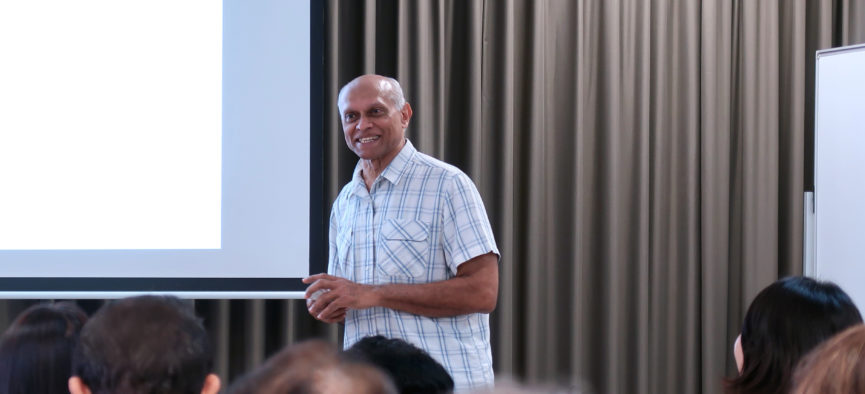All are Called to Evangelise
In a talk organised by Catholic Foundation for its ambassadors earlier this year, Rev Msgr Ambrose Vaz taught what it means to evangelise. He spoke about the importance of not just being called, but also our response to the call.
Evangelising is a very wide topic, so I have chosen a few points as an introduction to help you align yourselves with God’s will.
There are two very important prerequisites to evangelising: being aware that you are called by God, and saying “yes” – responding deliberately and intentionally.
God calls all of us
You cannot accept a task without someone first asking you to do it. Otherwise, you are simply being a busybody. Similarly, before you can evangelise, you must first be called to evangelise.
In the Gospel of Matthew, Jesus tells His disciples His will before ascending into heaven. He gave His disciples these three instructions: to make disciples of all nations; to baptise them in the name of the Father, the Son, and the Holy Spirit; and to observe everything He commanded. As affirmation, He also reminded them that they would not be alone. Just as Jesus instructed His disciples, so too is He calling each of us to evangelise.
That is the determining factor of a successful evangeliser – the realisation that God goes with us. The evil one tries to make us forget this and we get discouraged when our efforts fail, but we must always remember Jesus’ promise, even when we feel like giving up: “I am with you.”
This dynamic is important because if evangelisation is a decision I have made on my own, I will simply do what I decide is best. But if I realise that the initiative does not come from me, but rather from God, then I have to follow His agenda, not my own.
Unfortunately, in Church ministries, many of us very often forget this. We forget that God is the one who has called us, and instead, only remember being invited by a friend or a priest to serve in a ministry.
In actuality, the one calling us is God. He may have used an interest of yours, or a close friend, but you need to discern and recognise that these are the ‘props’ that God has used to remind you of your call. You have to realise and remember that He is the one calling you. This means you are accountable to Him.
Intentional discipleship
Being called is important, but equally important is the next step, to be a disciple of the One calling you to action. You cannot tell others about someone whom you do not know intimately.
We are called to do much more than to superficially share information about the faith. We are called to give others an experience of God’s love.
In St Luke’s Gospel, Jesus says, “Whoever is not with me is against me, and whoever does not gather with me scatters.” (Lk 11:23) In those days, they wore long robes, and by walking into the field, a person would damage all the grains that were to be harvested, and they would be lost. So if you are not intentionally going to harvest, you should not enter the field: you will only make things worse. If you are not proactive in wanting to carry out His will, you are actually doing just the opposite.
But what kind of evangeliser are you – active or passive? This makes a difference. The more passive disciples or evangelisers I see, the less impressed I will be with the faith.
Or, if you claim to be a member of a club, but you are never there in its uniform or do not participate in its activities, I will get the impression that it is simply not worth it. Even before getting to know it, I would already be disinterested in the club.
To be an evangeliser, I have to be an intentional disciple. I have to be in love with the Master, to have an intimate relationship with Him. To be a disciple requires us to be called, and to respond to it.
Jesus said, “You did not choose me, no, I chose you” (Jn 15:16). What is our response? The best example we can find in scripture is from Jesus Himself: “Here am I, Lord, I come to do your will.” (Heb 10:7)
Confirming our call
St Peter advised, “Therefore, brothers and sisters, be all the more eager to confirm your call and election, for if you do this, you will never stumble.” (2 Pt 1:10)
What did he mean by stumbling? It is about losing enthusiasm and getting disillusioned, because the evil one is definitely jealous when we promote and share about the kingdom of God. Whenever we try to get more people to fall in love with God and have a personal encounter of how good He truly is, the evil one will try all ways and means to lead us away, tempting us to give up or head in the wrong direction.
Sadly, sometimes people jump into serving without being convinced that they are called. That is a real problem because after some time they will realise that what they do is not motivated by God, rather by their own interests. When problems arise, these people stop serving. If I cannot remember that God called me, or if I do not think I am called, then there will be a domino effect, everything will fall apart.
Call, identity and mission
In both the Old and New Testaments, we read of key characters who, when they get disillusioned in their mission, remember their identity as persons chosen by God, and are sustained by their call. These include Jeremiah, Ezekiel, Elijah, Moses, St Paul and even Jesus in His agony in the garden of Gethsemane.
In his letter to the Galatians, Paul clearly introduces himself as “an apostle (identity) sent (mission) neither by human commission nor from human authorities, but through Jesus Christ and God the Father (call).” (Gal 1:1)
Our call, and our mission, is to evangelise. And our identity as Jesus’ disciples is connected to this call. Knowing and remembering this will propel us to carry out our mission regardless of any discouragement that we may face.
Reflecting on our own call to evangelise:
- How aware am I that I am being called?
- What makes me certain that I am being called?
- Is my response clear and intentional?
- Am I an active disciple of the One calling me?



 Clarice Chan, Chairwoman, Original Minds Group
Clarice Chan, Chairwoman, Original Minds Group










 Producer-Presenter, CatholicSG Radio
Producer-Presenter, CatholicSG Radio